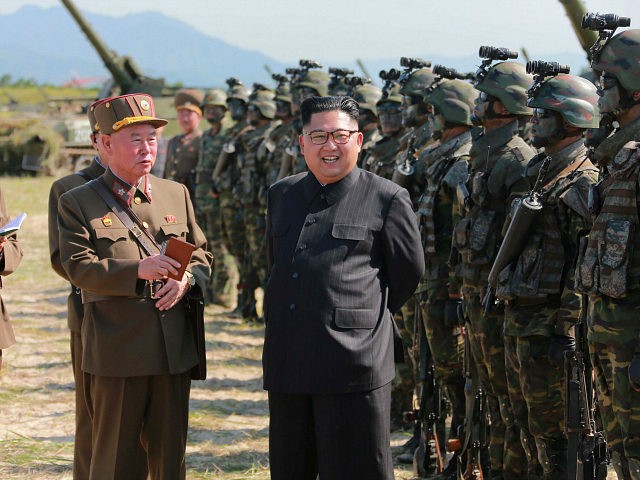America’s chief of naval operations said in an interview published Friday that U.S. options for a military response to North Korea’s routine belligerence are not “empty words” and that the military is “prepared” to act against Pyongyang if necessary.
Adm. John M. Richardson emphasized in an exclusive interview with South Korean outlet Yonhap that the U.S. military must be prepared to act in the event that diplomacy fails. The remarks follow an invitation from Secretary of State Rex Tillerson to the communist Kim regime to speak “without precondition,” leaving many media outlets wondering whether the Trump administration had changed its more hardline policy towards the regime.
“To have a legitimate deterrence, I think, you have to have legitimate, I guess, options. So we’re prepared,” Richardson told Yonhap, asserting that President Donald Trump’s warnings that the U.S. is ready for a military confrontation if necessary are not “empty words.”
Richardson noted that diplomacy is always the preferable route and added:
But we in the military understand that we have to be prepared for any kind of increasing capability that could come from the North, that would threaten us from the North, so that we could prevail and that we provide a firm backstop to the diplomatic and economic efforts that are going on the lead.
The remarks do not directly contract Tillerson, as Richardson asserted that military action would be a last and undesirable resort for Washington. On Tuesday, Tillerson told an audience at the Atlantic Council, “We’ve said from the diplomatic side, we’re ready to talk anytime North Korea would like to talk. We are ready to have the first meeting without precondition.”
“Let’s just meet, and we can talk about the weather if you want,” he continued. “Talk about whether it’s going to be a square table or a round table, if that’s what you are excited about. But can we at least sit down and see each other face to face, and then we can begin to lay out a map, a roadmap of what we might be willing to work towards.”
His use of the phrase “without precondition” startled many who noted that the official White House line did not accept the possibility of such a discussion and that Trump himself had described Tillerson’s work on North Korea as a “waste of time.” Tillerson did note one precondition, however: that North Korea cease to engage in military provocations – typically intercontinental ballistic missile (ICBM) tests, but sometimes nuclear weapon tests – for an extended period of time as a show of goodwill.
The remarks precede a reported Tillerson visit to Canada to discuss the potential of multilateral North Korea talks with far-left Prime Minister Justin Trudeau, which Reuters reported is expected to occur on December 19. Trudeau has attempted to engage other rogue regimes to participate in legitimizing North Korea, most prominently the communist government of Cuba, to which he has close familial ties.
Another communist government, China, applauded Tillerson’s call for talks “without precondition.”
“We have noticed the remarks. It has been a consistent stance of the Chinese government to peacefully resolve the peninsula issue through dialogue and negotiation. China welcomes all efforts to ease tension and promote dialogue to resolve the problem,” Foreign Ministry spokesman Lu Kang said on Wednesday.
North Korea’s state media have not issued a formal response to Tillerson, instead repeatedly threatening nuclear war against the United States, as usual.
In the interview published Friday, Yonhap also approached Richardson regarding the possibility that South Korea could develop a nuclear weapons program. As a presidential candidate, Donald Trump told reporters, “I hate proliferation,” but Washington must ask whether “we’re better off if Japan protects itself against this maniac in North Korea.” He noted that America’s defense expenses in South Korea, Japan, Saudi Arabia, and other nations were astronomical and merited review, alarming some in those countries.
Richardson said the development of a nuclear program is a “challenge that really only the Republic of Korea can answer for itself.”
“I can say from experience that a nuclear Navy requires a significant investment and initial investment and continued investment in things like manpower, industry, safety, and so as any nation goes through the strategic calculus as to whether to develop a nuclear powered warship, whether it’s a submarine or whatever, all of that has to be appreciated in the balance,” he advised.

COMMENTS
Please let us know if you're having issues with commenting.